By Carissa Rutkauskas
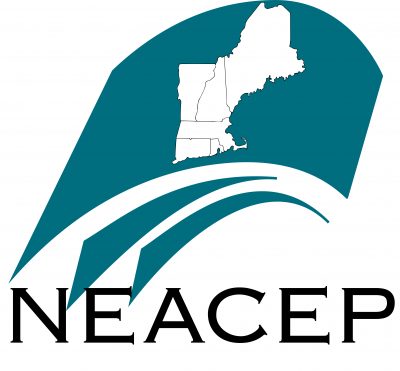 The University of Connecticut Early College Experience Program hosted the 2024 New England Alliance of Concurrent Enrollment Partnerships (NEACEP) annual conference on Friday, May 17, 2024 in the UConn Student Union. Approximately one-hundred dual/ concurrent enrollment and early college professionals and advocates from Connecticut, Maine, Massachusetts, New Hampshire, Rhode Island, Vermont, as well as several experts from outside of New England were in attendance. The event was kicked off by a warm welcome by Kari Suderley, NEACEP President/ Director of Early College Programs, University of Maine and Dr. Amit Savkar, Interim Associate Vice Provost CETL, University of Connecticut.
The University of Connecticut Early College Experience Program hosted the 2024 New England Alliance of Concurrent Enrollment Partnerships (NEACEP) annual conference on Friday, May 17, 2024 in the UConn Student Union. Approximately one-hundred dual/ concurrent enrollment and early college professionals and advocates from Connecticut, Maine, Massachusetts, New Hampshire, Rhode Island, Vermont, as well as several experts from outside of New England were in attendance. The event was kicked off by a warm welcome by Kari Suderley, NEACEP President/ Director of Early College Programs, University of Maine and Dr. Amit Savkar, Interim Associate Vice Provost CETL, University of Connecticut.
During the Plenary Session, participants had the opportunity to hear from six program directors, a school superintendent, and a state chief performance officer as they offered insights into the landscape of dual and concurrent enrollment programs in their respective states. The panel highlighted key aspects of their programs such as program structure, partnerships, goals, achievements, and advancements, sparking further discussion and idea sharing from the audience.
A total of 14 breakout sessions were featured throughout the day, covering various aspects of early college programs, research, equity, policy, and support resources. Topics ranged from 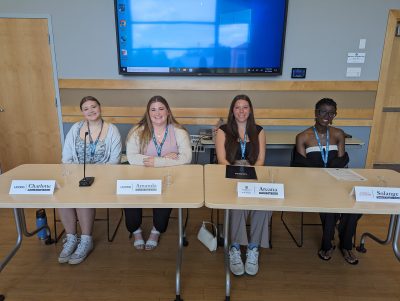 stakeholder perspectives on research, alumni insights, collaborative initiatives for improving early college access, and disrupting racist systems to promote student success. Sessions also delved into advanced course patterns, educator pathways, dual enrollment policies, diverse learning landscapes, career pathways advising, support for multilingual students, recognition in early college programs, targeted support for trade occupations, and a comprehensive look at Connecticut State Community College’s early college programs. The conference concluded with closing remarks from Kari Suderley, door prizes, and the distribution of certificates. Participants left with valuable insights and a growing network of connections in the field.
stakeholder perspectives on research, alumni insights, collaborative initiatives for improving early college access, and disrupting racist systems to promote student success. Sessions also delved into advanced course patterns, educator pathways, dual enrollment policies, diverse learning landscapes, career pathways advising, support for multilingual students, recognition in early college programs, targeted support for trade occupations, and a comprehensive look at Connecticut State Community College’s early college programs. The conference concluded with closing remarks from Kari Suderley, door prizes, and the distribution of certificates. Participants left with valuable insights and a growing network of connections in the field.
Special thanks to the following partners for participating in the Plenary Session:
- Christopher Todd, Executive Director, Office of Early College Programs, University of Connecticut
- Salvatore Menzo, EdD, Superintendent of Goodwin University Magnet Schools
- Ajit Gopalakrishnan, Chief Performance Officer, Connecticut State Department of Education
- Beth Doiron, Director of College Access and NHED Programs & Initiatives Community College System of New Hampshire
- Jerry Appell, Early College Coordinator, River Valley Community College -Community College System of New Hampshire
- Amy Hubbard, Executive Director of Early College, University of Maine System
- Mercedes Pour, Director of College Access and Secondary Partnerships, Maine Community College System
- Phylitia Jamerson, Executive Director of Early College, Commonwealth of Massachusetts, Department of Education
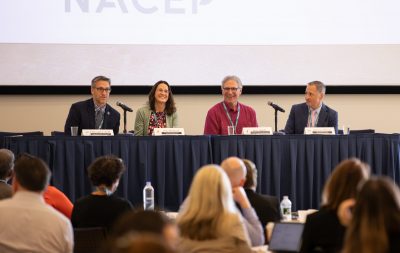
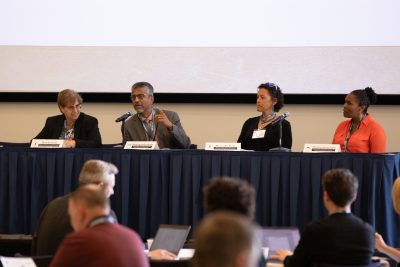
Explore a complete list of topics, presenters, and slides on the NEACEP conference website.
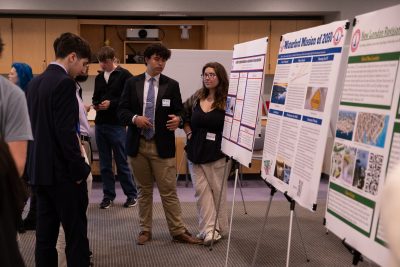 Claudia Koerting, UConn ECE Marine Science Faculty Coordinator, organized and led the event as she has for the past 10 years with the goal of extending student learning outside of the classroom and building relationships between students, instructors, and UConn faculty. This end-of-year event celebrates the academic achievements of the students throughout their UConn Marine Sciences courses taken through UConn ECE and exposes them to the UConn Avery Point faculty and facilities.
Claudia Koerting, UConn ECE Marine Science Faculty Coordinator, organized and led the event as she has for the past 10 years with the goal of extending student learning outside of the classroom and building relationships between students, instructors, and UConn faculty. This end-of-year event celebrates the academic achievements of the students throughout their UConn Marine Sciences courses taken through UConn ECE and exposes them to the UConn Avery Point faculty and facilities.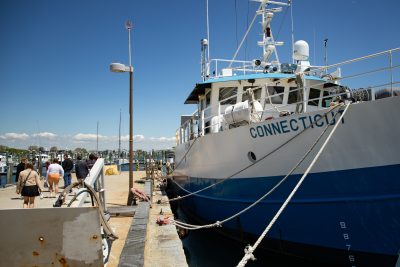 sonal research and life as a UConn student, and then took to the campus in the afternoon to explore.
sonal research and life as a UConn student, and then took to the campus in the afternoon to explore.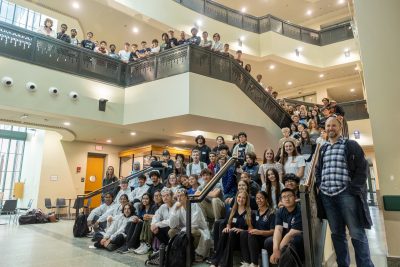
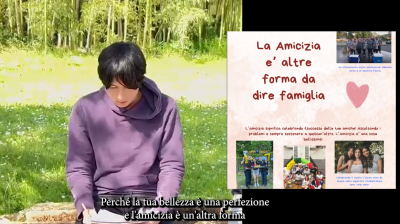
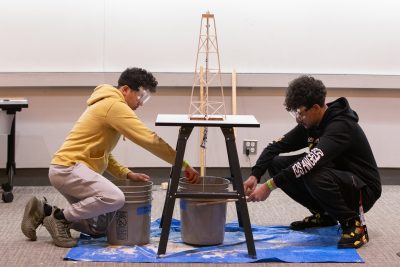 rs.
rs.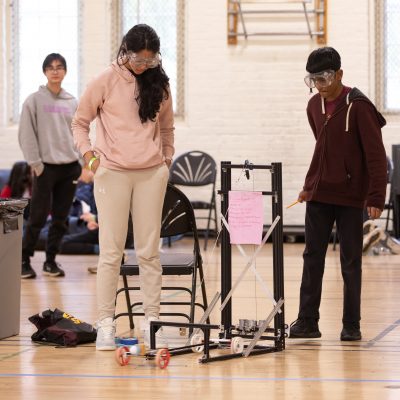
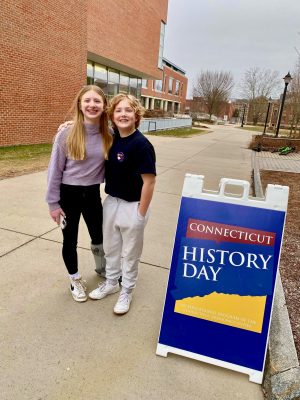
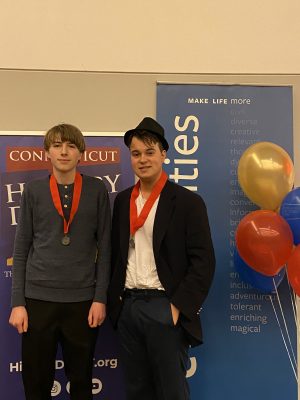 s from students at the Mansfield Regional Contest:
s from students at the Mansfield Regional Contest: 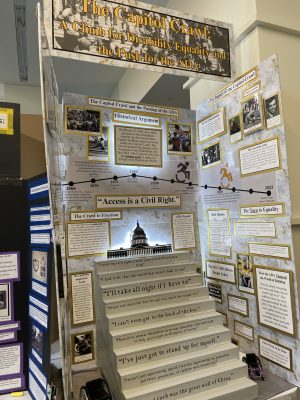
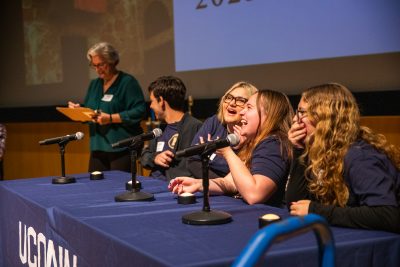 Christopher Todd, kicked off the day with a warm welcome to all student participants and Instructors from Bristol Central High School, Plainville High School, North Haven High School, and Newington High School. Students were set up for an exciting day full of immersing themselves in Italian culture, grammar, history, and much more. They were encouraged to take full advantage of this opportunity – to interact with the amazing UConn Italian Teaching Assistants who facilitated the morning Immersion Sessions, collaborate with their peers from neighboring Connecticut high schools, and to bring their best to the head-to-head, jeopardy-style Quiz Bowl competition.
Christopher Todd, kicked off the day with a warm welcome to all student participants and Instructors from Bristol Central High School, Plainville High School, North Haven High School, and Newington High School. Students were set up for an exciting day full of immersing themselves in Italian culture, grammar, history, and much more. They were encouraged to take full advantage of this opportunity – to interact with the amazing UConn Italian Teaching Assistants who facilitated the morning Immersion Sessions, collaborate with their peers from neighboring Connecticut high schools, and to bring their best to the head-to-head, jeopardy-style Quiz Bowl competition.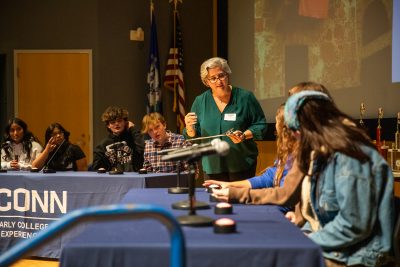
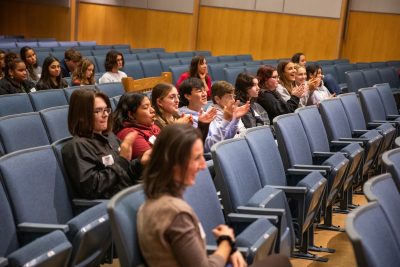 with another high school in hopes to buzz in first and answer enough questions correctly to qualify for the next round. Students had limited time to answer questions, and they had to provide their answers in Italian only. Dr. Chiappetta-Miller stated, “the Quiz Bowl ended in no less than a twist when it turned out that Newington and Bristol Central had drawn. We had to go to penalties and the Newington team came out on top!” It was a very exciting and close competition, with Newington High School winning first place, followed by Bristol Central High School in second place, and Plainville High School in third place. A bonus MVP round was played at the end of the event, where individual students competed on stage against one another. Alex from Newington High School was named the MVP of the day.
with another high school in hopes to buzz in first and answer enough questions correctly to qualify for the next round. Students had limited time to answer questions, and they had to provide their answers in Italian only. Dr. Chiappetta-Miller stated, “the Quiz Bowl ended in no less than a twist when it turned out that Newington and Bristol Central had drawn. We had to go to penalties and the Newington team came out on top!” It was a very exciting and close competition, with Newington High School winning first place, followed by Bristol Central High School in second place, and Plainville High School in third place. A bonus MVP round was played at the end of the event, where individual students competed on stage against one another. Alex from Newington High School was named the MVP of the day.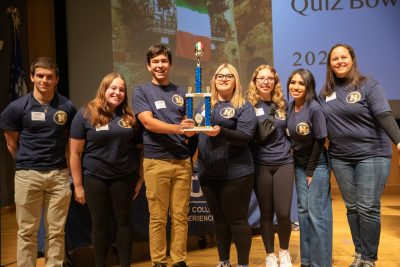
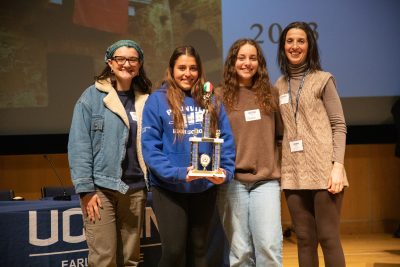
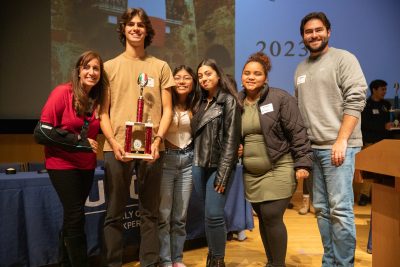
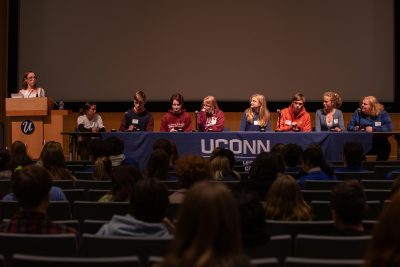 Dr. Florence Marsal, UConn ECE French Faculty Coordinator, the day was set up in a very similar manner to the Italian event. The French Immersion Day & Quiz Bowl is the longest running UConn ECE student language event, dating back to 2001. Since its creation, several hundred students have participated from dozens of our partner high schools across the state. This year UConn ECE Instructors brought about 80 student participants, representing Lewis S Mills High School, Daniel Hand High School, Lyme-Old Lyme High School, Granby Memorial High School, Cheshire High School, Nathan Hale-Ray High School, Tolland High School, and Edwin O. Smith High School.
Dr. Florence Marsal, UConn ECE French Faculty Coordinator, the day was set up in a very similar manner to the Italian event. The French Immersion Day & Quiz Bowl is the longest running UConn ECE student language event, dating back to 2001. Since its creation, several hundred students have participated from dozens of our partner high schools across the state. This year UConn ECE Instructors brought about 80 student participants, representing Lewis S Mills High School, Daniel Hand High School, Lyme-Old Lyme High School, Granby Memorial High School, Cheshire High School, Nathan Hale-Ray High School, Tolland High School, and Edwin O. Smith High School.
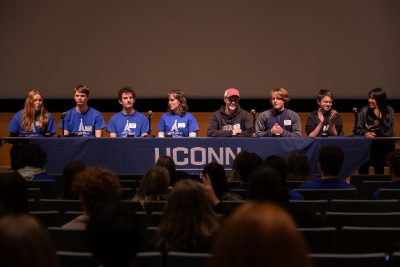 the Quiz Bowl include:
the Quiz Bowl include: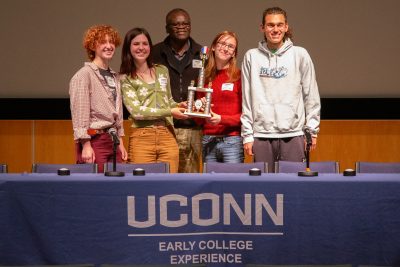
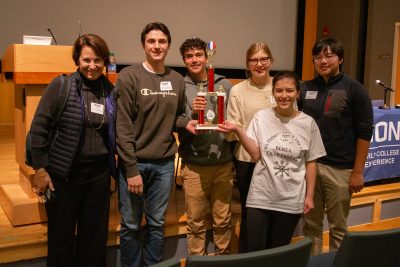
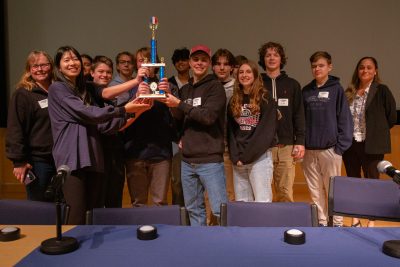
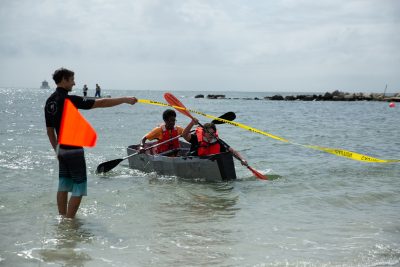 Friday, October 6th. With over 300 students in attendance, we kicked off the academic year with one of our largest annual student events! This year’s theme, School Mascots, in honor of UConn’s newest addition Jonathan XV, brought about much collaboration, dedication, teamwork, and school spirit which was quite evident as students prepared for and participated in the event. Students
Friday, October 6th. With over 300 students in attendance, we kicked off the academic year with one of our largest annual student events! This year’s theme, School Mascots, in honor of UConn’s newest addition Jonathan XV, brought about much collaboration, dedication, teamwork, and school spirit which was quite evident as students prepared for and participated in the event. Students 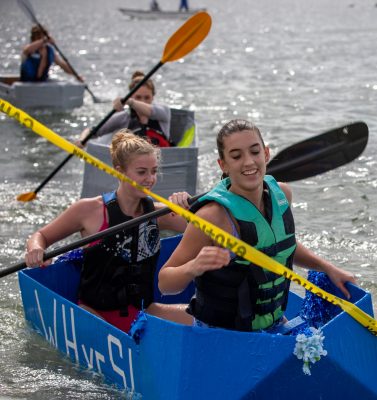 spent countless hours prior to race day planning and building their handcrafted cardboard and duct tape boats, and then arrived at the event eager to listen, engage, and share failures and successes with their peers and presenters.
spent countless hours prior to race day planning and building their handcrafted cardboard and duct tape boats, and then arrived at the event eager to listen, engage, and share failures and successes with their peers and presenters.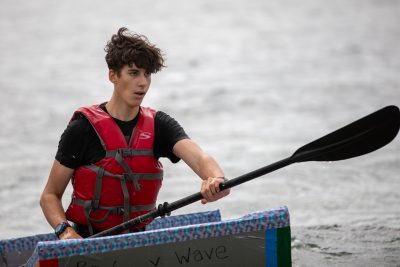 awards presented for placing in the races, The Morgan School’s “M.S.S. Dog Pound” took home the Best Visual Award, The Sound School’s “Usain Boat” won the Best Boat Name Award, East Granby High School’s “The Templor Transporter” was awarded the new Interdisciplinary Collaboration Award, and University High School of Science & Engineering’s boat, “The Raging Rooster”, earned the People’s Choice Award.
awards presented for placing in the races, The Morgan School’s “M.S.S. Dog Pound” took home the Best Visual Award, The Sound School’s “Usain Boat” won the Best Boat Name Award, East Granby High School’s “The Templor Transporter” was awarded the new Interdisciplinary Collaboration Award, and University High School of Science & Engineering’s boat, “The Raging Rooster”, earned the People’s Choice Award.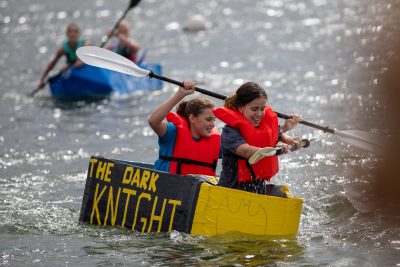
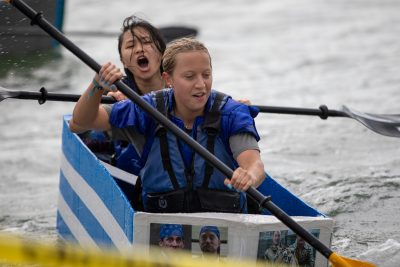
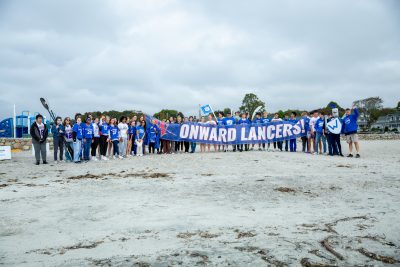
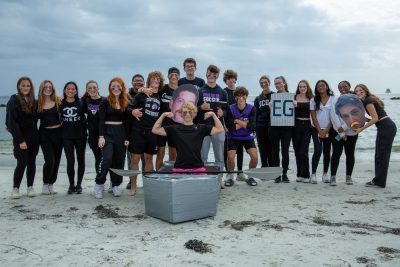
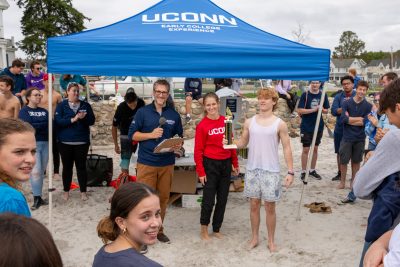
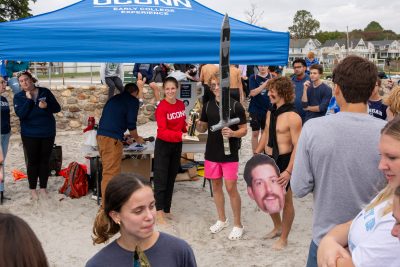
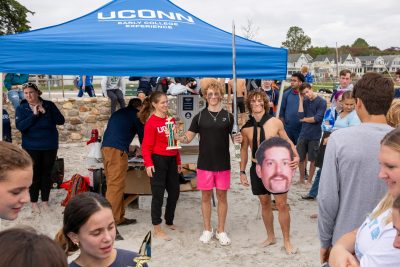
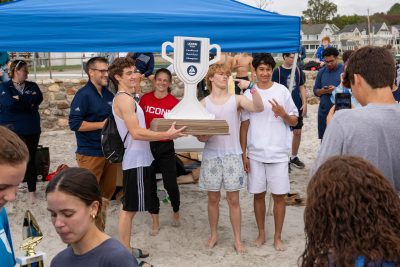
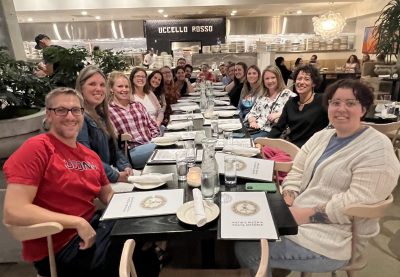 colleagues Ansley Diamond, Associate Vice President of Academic Affairs, Connecticut State Colleges and Universities (CSCU) System and Program Manager for Library Consortium Operations, Patrick Carr, first time NACEP attendees who were making connections with concurrent and dual enrollment for the State.
colleagues Ansley Diamond, Associate Vice President of Academic Affairs, Connecticut State Colleges and Universities (CSCU) System and Program Manager for Library Consortium Operations, Patrick Carr, first time NACEP attendees who were making connections with concurrent and dual enrollment for the State.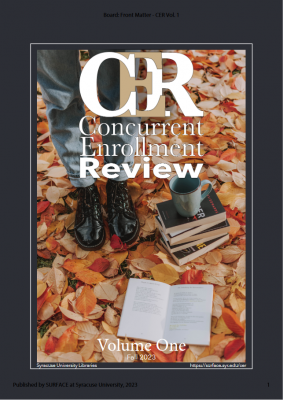 Executive Director, joins colleagues from Syracuse University, Boise State University, and University of Pittsburgh to serve as an Associate Editor. Carissa Rutkauskas’s, UConn ECE’s Outreach and Evaluation Specialist, with former UConn ECE graduate student, high school teacher, and Labor Organizer with the Connecticut Education Association, Kathrine Grant’s paper Formative Threads in the Tapestry of College Credit in High School: An Early History of the Development of Concurrent Enrollment and a Case Study of the Country’s Oldest Program was included. Their research explores contributing factors to DE/CE development and provides a historical review of the longest running CE program in the United States, the University of Connecticut’s Early College Experience Program, founded in 1955.
Executive Director, joins colleagues from Syracuse University, Boise State University, and University of Pittsburgh to serve as an Associate Editor. Carissa Rutkauskas’s, UConn ECE’s Outreach and Evaluation Specialist, with former UConn ECE graduate student, high school teacher, and Labor Organizer with the Connecticut Education Association, Kathrine Grant’s paper Formative Threads in the Tapestry of College Credit in High School: An Early History of the Development of Concurrent Enrollment and a Case Study of the Country’s Oldest Program was included. Their research explores contributing factors to DE/CE development and provides a historical review of the longest running CE program in the United States, the University of Connecticut’s Early College Experience Program, founded in 1955.